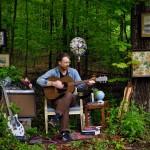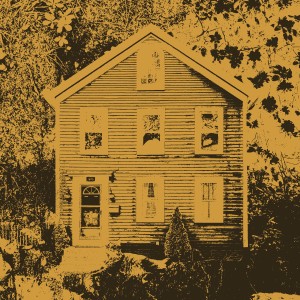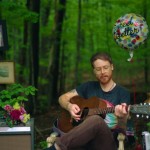
Artist

IMAGES: To download, click above. Top photo courtesy of the artist. Woods photo credits to Laura Mason.
GOLD DUST
Centripetal Force
Up until this point, Western Massachusetts musician Stephen Pierce’s solo vehicle Gold Dust has materialized slowly and maneuvered in a series of strange trickles. The songs first incubated in the quiet, internal spaces of solitary home recording sessions during the especially bleak winter of 2020, when Pierce began refracting his years spent playing in high-volume punk and shoegaze bands through the lens of acoustic songwriting. Stripping away the layers of noise only revealed the commonalities that could exist between full-blast hardcore and an unadorned statement of vulnerability. Gold Dust gradually became a means for Pierce to explore this nexus point, slowly piecing together songs that held the fragile wonderment of the Grateful Dead, the weary beauty of Elliott Smith, the melancholic twang of the Byrds, and the otherworldly density of My Bloody Valentine while always reaching for hope and connectivity in a way that was universal. Piecemeal fragments of inspiration eventually congealed into a cohesive first album, and an ongoing time of no tours and vinyl manufacturing delays afforded the album a particularly slow public blooming. Neither the slow-to-form creative process of the first album nor the ambling pace often taken by Pierce’s thoughtful, dreamily damaged psychedelia points to rapid evolution, but that’s exactly what’s taking place on second album The Late Great Gold Dust.
In the months between wrapping up production on the first album and it eventually reaching the public, Pierce quickly began thinking about the follow-up. The reignition of a long-dormant interest in poetry brought a closer focus on lyricism and a deeper consideration of what the words were trying to express. The themes of isolation and self-doubt that floated in glistening clouds of reverb on the first album began to sharpen, and the language around these difficult feelings took on a new clarity. Pierce’s songwriting has always held a distant sadness, but with The Late Great Gold Dust, the melancholy cuts through, feels more present and alive within the songs. There’s a muddy narrative arc to these twelve songs, getting more harrowing throughout the album’s second half as screams echo in the void until an exhausted sigh that sounds something like acceptance rises out of the murk. This incremental ramp up from the album’s lighter material to its most depressive follows the same Side A/Side B mapping that made both Neil Young’s On the Beach and Black Flag’s My War different articulations of the same creeping intensity.
The Late Great Gold Dust steps into new dimensions musically as well. Pierce continues the layers of jangle, fuzz, and sunny vocal harmonies that made the first album equal parts tender and strange, but takes new risks with production, texture, and instrumentation. Album opener “Go Gently” erupts with near-metal doominess that fades into gentle folk softness, with layers of acoustic instruments and psychedelic fuzz melting together. “Proof of Life” builds around contemplative dulcimer parts, again stacking its instrumentation in thick layers. Throughout the album groggy synths and scene-setting field recordings work their way into dynamic arrangements that significantly expand Gold Dust’s depth. Pierce played every instrument and sang every vocal on the first album, and while he still handles the lion’s share of the performances here, he brings in several friends to add new angles to the tunes: guest vocals, moody Fender Rhodes, Hammond organ, damaged synth, and J Mascis lending his instantly-recognizable guitar with a “Maggot Brain” level solo on “Larks Swarm a Hawk,” the track that closes out side one. Eloquent weirdo Sean Yeaton of Parquet Courts contributes a short story for the liner notes, narrated from somewhere between the natural world and all the psychedelic computerized kitchens of the future.
The songs get heavier as Pierce throws his arms open wider on The Late Great Gold Dust. It’s an album built on sweet sounds and sharp turns, willing to turn over every stone, drive the car off the road, and look ugly truths directly in the face if there’s a chance any of it will result in a deeper understanding.
Fred Thomas



